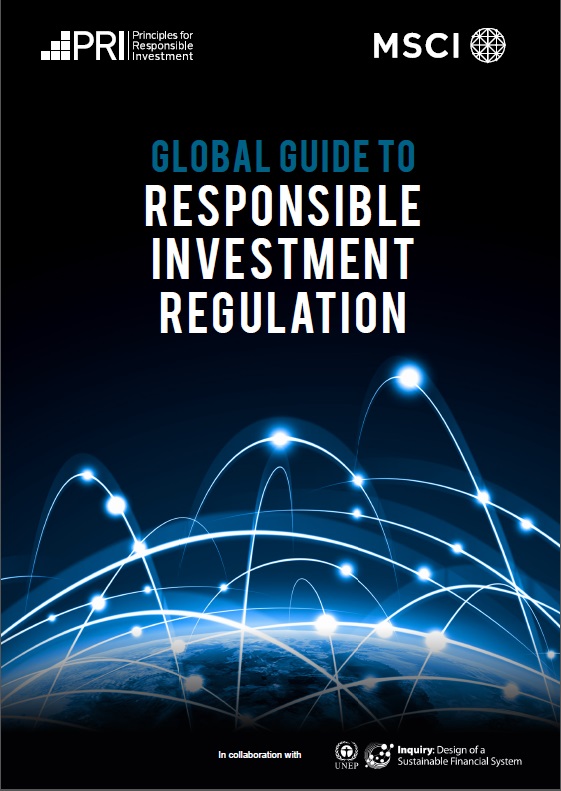Global Guide to Responsible Investment Regulation
EXECUTIVE SUMMARY
This report is the first global study to analyse the impact of responsible investment-related public policy initiatives. It focusses on the perceptions of the investor community to draw conclusions about the impact of regulation on investment practice. Through quantitative analysis and interviews with investors, stock exchanges, policymakers and regulators, we found that:
RESPONSIBLE INVESTMENT POLICY IS WIDESPREAD AND THE PACE IS INCREASING
In the largest 50 economies in the world, we identified almost 300 policy instruments which support investors to consider long-term value drivers, including ESG factors. Over half of these were created between 2013 and 2016.
THERE'S SOME EVIDENCE THAT IT'S DRIVING BETTER ESG PERFORMANCE BY COMPANIES
We found a strong correlation between responsible investment regulation and better ESG risk management by companies. This is encouraging, especially given how recent many of these policies are. However, while some regulations are driving real change in the way investors consider ESG issues, many are not perceived to be impactful.
POLICY EFFECTIVENESS IS HAMPERED BY WEAK IMPLEMENTATION AND WEAK SIGNALS
Investors are sceptical of the effectiveness of policy because of weaknesses in policy design and monitoring and inconsistency between different government departments and regulators. Added together, these send a signal to investors that sustainability is separate from the core purpose of financial markets.
DESPITE THE INCREASE IN SUSTAINABLE FINANCE REGULATION, MOST GOVERNMENTS AREN’T CONNECTING SUSTAINABILITY AND CAPITAL MARKETS POLICY – BUT THERE ARE SIGNS THIS IS BEGINNING TO CHANGE
Few of the investors interviewed felt these regulations were clearly embedded in a wider strategy for capital markets and sustainable development. Correspondingly, few of the investment-focussed policy initiatives we analysed were clearly linked to specific sustainability objectives. However, there are signs that this is starting to change, with governments such as those in China and the European Commission announcing initiatives to align capital markets with sustainability goals.
MAPPING RESPONSIBLE INVESTMENT POLICY
Over half of all responsible investment policy dates from the last three years.
In the early part of 2016, the PRI mapped out all existing responsible investment policy - almost 300 individual policy tools or market-led initiatives, covering the relationship between finance and ESG issues3. We focussed our study on the top 50 economies by GDP. Of these, only Iran has no policy initiatives relating to ESG factors and investment. These initiatives are a recent phenomenon, and the pace is increasing. We found that over half of all responsible investment policy dates from the period 2013-2016 (figure 1).
This demonstrates that responsible investment regulation is on the agenda for policymakers, investors and civil society worldwide. With this report, we want to understand whether these regulations are really changing the way investors, and ultimately companies, behave on ESG issues.
MAKING THE CONNECTION: SUSTAINABILITY POLICY AND INVESTMENT POLICY
Few governments articulate the role investors are expected to play in sustainable economies.
As thousands of individual environmental or social protection regulations exist around the world, this analysis focussed on those with an investment component5. This meant we excluded most of the highest profile government sustainability commitments because few articulate the role investors are expected to play. Correspondingly, few of the investment-focussed policy instruments we analysed were clearly linked to specific sustainability objectives.
While some of the policymakers we interviewed were clear that the financial system could play a role in sustainable economies, few were more specific. This failure to articulate the role of the financial system in sustainable development has consequences:
• It gives the impression that sustainability and financial markets are unconnected and that ESG issues are financially irrelevant.
• It leads to regulatory confusion, with responsible investment policy unaligned with prudential or securities regulation.
• Financial system actors and governments can’t be held to account for whether the financial system is contributing to progress – or undermining it.
There are signs that this is beginning to change.
• In August 2016, China launched Guidelines on Establishing the Green Financial System with the Governor of the People's Bank of China providing a clear articulation of the link between finance and ESG, commenting that "establishing a green finance system has become a national strategy."
• France’s Energy Transition Law has identified failure to adapt to climate change as a major market failure. It sets out a broad action plan for transitioning to a low-carbon economy – including a requirement for institutional investors to disclose how they are contributing to national carbon targets.
• In September 2016, the European Union announced that it will develop a sustainable finance strategy for European capital markets. Building from a call for evidence on the state of sustainable investment, the strategy will identify policy measures to ensure that the financial system supports growth in a way that is sustainable6, building on the EU 2020 targets and the EU’s commitments to the COP21 agenda and the SDGs.
While it is too early to assess the impact of these initiatives, it shows that some policymakers are strengthening their commitment to supporting sustainable finance.
To download the full report, please click here.
